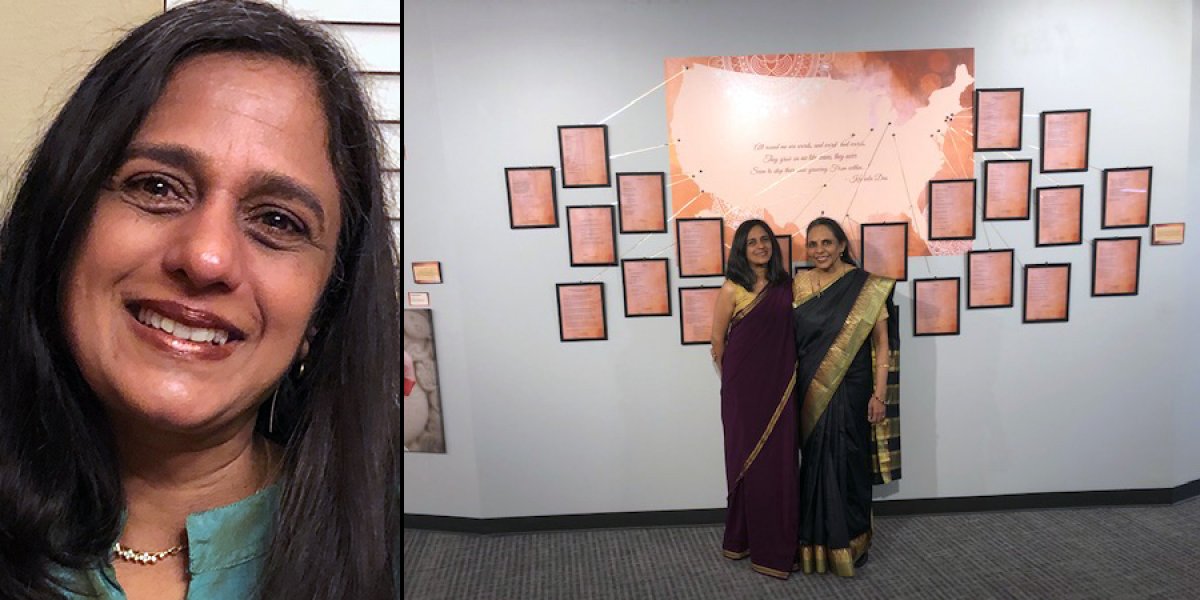Success is ‘we’ not ‘I’ — Usha Akella
Poet Usha Akella (Lucy Cavendish 2016) realised that many South Asian diaspora poets experienced exclusion from the wider poetry community. This led her to set up Matwaala — a festival to give visibility and voice to South Asian poets.
I wrote every day of my life as long as I could remember nurturing the dream to be a poet very early on.
Early on, I risked redefining success unconscious that it was a risk. It was insufficient to succeed alone—my sense of wellbeing is tied to others—a notion imbibed from the community-based society of my childhood in India. So, my work as a poet has always had a component of activism and group welfare to it. I had launched a project in 2003, the ‘Poetry Caravan’ in the White Plains, New York area and for a shorter duration in Austin. Well over a thousand free readings have reached disadvantaged audiences in women’s shelters, senior homes and hospitals via this project. The mayor of Austin proclaimed 7 January as Poetry Caravan Day in 2016 in recognition of the work in Austin where I live now.
Whom do we first write for?
I migrated to the US in 1993 and have been engaged with poetry formally since then. I vividly remember my first open-mike reading in Baltimore. It seemed a miracle there’d be an audience willing to listen to my innermost journeying. I grew up in Hyderabad without advantages of creative writing classes, literary journals, poetry readings—all the markers of a poetry industry. I wrote every day of my life as long as I could remember nurturing the dream to be a poet very early on. So, when disappointments come my way now as they do regularly as a writer, I remember that little girl writing in Hubshiguda, Hyderabad with no material incentives yet who persisted for two decades. Whom do we first write for? I hark back to that fundamental question.
Things began to gradually happen when I enrolled for a Masters in Publications design at the University of Baltimore where I took my first creative writing class with Kendra Kopelke. She was the first gateway, the one who gave me the permission to write as Natale Goldberg would say. Twenty-five years later, more things have unfolded than I could possibly have imagined.
Matwaala - a free spirit
The idea of the festival crystallized out of a growing sense of unease. The poetry industry was a gated community and we didn’t have the gate code to enter. Many South Asian diaspora poets had a story of exclusion. It could never be proved but only experienced. Pramila Venkateswaran, a Long Island poet, and my indomitable co-director shared my concerns. We’d often talk about the need to harness South Asian poets as a group. We just didn’t feel the representation was adequate. We strongly felt that consolidation was necessary to make worthwhile strides as legitimate American poets. So Matwaala was launched in Austin in 2015 from the urge to increase the visibility of South Asian poetry. Matwaala is used for someone who is drunk, but the word is used more often in a transferred sense, for someone who is a free spirit. We’ve had five wonderful festivals so far.
Success is ‘we’ not ‘I’
2019 was a coming-of-age year for the project. We launched our website that year, the festival was hosted by NYU, Hunter College, Nassau Community College and the iconic reading spot, the Red Room. We received funding from Poets and Writers and were featured on their blog. I’d just graduated from the Masters in Creative Writing program at Lucy Cavendish and was passionate about bringing a reading by South Asian diaspora poets to Cambridge University. Professor Jenny Bavidge was instrumental in organising the reading at Murray Edwards College. Two UK-based poets, Kavita Jindal and Yogesh Patel attended the festival in New York City creating a link with other diaspora poets and highlighting diaspora experience is not a monolithic voice.
It is absolutely heartening when one’s alma mater supports work even though we move on. My years at Cambridge are indelible; it all seems a bit surreal now, the classes at Madingley Hall with Jem Poster, Sara Burton and Midge Gillies, those trans-Atlantic flights to Heathrow and jostling onward by coach, racing with the clock to finish assignments, the walks by the backs...
An article about my experiences here is due in lucywritersplatform.com edited by Hannah Hutchings-Georgiou who has been a staunch and warm support. She recognised the value of the project first and published an article in her magazine, thereon the alumni newsletter at Lucy Cavendish carried an article on the poetry wall, a project I was delighted to facilitate.
I do hope to continue the connection with my College and program that was a major landmark in my path as a poet. The recent publication of an anthology of writing by our cohort was a valuable gesture by the program, a reminder of the talent that brought us together, by which we move on in the world.
Usha Akella studied Creative Writing and attended Lucy Cavendish College.
If you would like to submit your own alumni story, send us an email for details of our submission guidelines.
This article has been written by Usha and the opinions expressed are those of the author.
